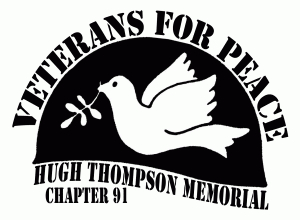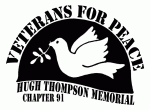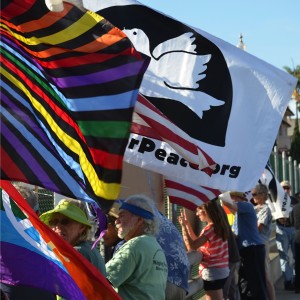While the federal government contemplates military action against the regime in Syria for its alleged use of chemical weapons in the ongoing civil war there, a number of local residents are already mobilizing to take action.
They’re honing the message, enlisting recruits, organizing campaigns and readying to march in preparation of a potential struggle, but not against Syria or any other adversary. Instead, their aim is peace.
“We apply non-violent direct action,” said Jim Summers, a Navy veteran from Solana Beach and a founding member of the San Diego chapter of Veterans for Peace (VFP). “We learned from the military how to be strategic, tactical and logistical. I bet some of them regret teaching us.”
With the country winding down the longest war in its history in Afghanistan, Del Mar peace activist Martha Sullivan believes the conflict currently being proposed can be averted because people are fatigued with military action.
“Politicians think they’ve figured out what hot buttons will get people on their side,” said Sullivan. “The problem is that you can’t keep using that because it’s shown to make you skeptical. People are increasingly getting wise to that and they’re getting tired of that…Americans are seeing there are no benefits, just sacrifices.”
Sullivan has been involved with a number of local antiwar/peace organizations, such as the San Diego Coalition for Peace and Justice, and the Peace Resource Center of San Diego among others, for more than 10 years and is a founding member of Women Occupy San Diego.
If peace activists take a dim view of just about every call to war, it’s because they take the long view of America’s involvement historically in conflicts far from home. When Gilbert Field, a Carmel Valley resident and past president of VFP, discusses claimed reasons for wars that eventually turn out to be false, he doesn’t just talk about the recent Iraq War but mentions Vietnam (during which he served in the Coast Guard) and others all the way back to the Spanish-American War.
“We seem to do this,” he said. “Every time we’re offended, and even if we’re not, we just seem to do it. We want to do it. I don’t believe we’re a war-like people, but we seem to go to war for the strangest justifications and we seem to do it again and again.”
On the surface, it might seem counterintuitive to organize demonstrations, marches and vigils against war in a city so steeped in the military tradition like San Diego. However, Summers argues that support is garnered almost effortlessly from many of the 250,000 veterans in the county because those who have seen the tragic costs of war firsthand are usually the first to oppose it.
“The easiest place to recruit peacemakers is among vets and the military,” he explained. “They’ve already accepted that making the world a better place is part of their job. Second, by being in the military, they’re used to the BS. They came out seeing what it’s really about.”
While Field agrees with the assessment, he concedes that resistance to antiwar efforts is strong in San Diego because the multi-billion dollar armaments industry still has deep roots — and plenty of employees — here.
“It’s hard to get someone to support peace when their livelihood depends on war,” Field said. “There is no money to be made in peace. So we have a natural support base and a natural hostile group.”
Yet opposing war no longer consists exclusively of marching in peace demonstrations in the age of I-phones, Internet and instant communications, noted Sullivan. Multimedia platforms have opened up the opposition to multipronged actions.
“Organizing now is not just boots on the ground,” Sullivan said. “It’s more a kind of swarm approach. That makes it more accessible to people. For people who are concerned with their jobs or raising kids or taking care of elderly parents, it can be challenging to get them physically out to things, but they can participate on online petitions. [They can] send emails to congress people and senators. They can share it with family and friends.”
Promoting peace can become a full-time job, activists say, fraught with hardships, setbacks and open antagonism. Sometimes those difficulties can spillover into their private lives.
“For the most part, life goes on,” said Field. “But it has made some long-standing friendships strained. Like anything, you find that friendships grow or fade because of what you’re doing at present.”
Having seen some of the worst of it as a Navy hospital corpsman from 1973-77, Summers credits his colleagues and work at VFP with “saving (his) sanity.” With five children and several grandchildren, he finds his peace activism to be one of his most important services to the country and their future.
“A war always leaves the world worse off,” said Summers. “Even the winner is worse off. You can’t win an earthquake…Fear is not the greatest American value. It’s time to show some courage and not be ruled by fear.”
By Steven Mihailovich
http://www.delmartimes.net/2013/09/12/local-peace-activists-prepare-for-battle/









